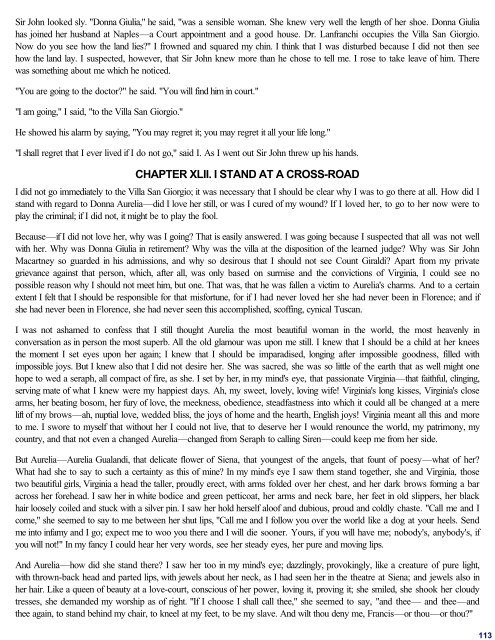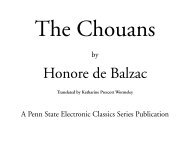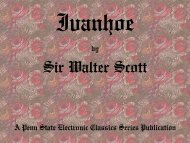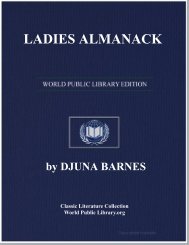THE FOOL ERRANT - World eBook Library - World Public Library
THE FOOL ERRANT - World eBook Library - World Public Library
THE FOOL ERRANT - World eBook Library - World Public Library
You also want an ePaper? Increase the reach of your titles
YUMPU automatically turns print PDFs into web optimized ePapers that Google loves.
Sir John looked sly. "Donna Giulia," he said, "was a sensible woman. She knew very well the length of her shoe. Donna Giulia<br />
has joined her husband at Naples—a Court appointment and a good house. Dr. Lanfranchi occupies the Villa San Giorgio.<br />
Now do you see how the land lies?" I frowned and squared my chin. I think that I was disturbed because I did not then see<br />
how the land lay. I suspected, however, that Sir John knew more than he chose to tell me. I rose to take leave of him. There<br />
was something about me which he noticed.<br />
"You are going to the doctor?" he said. "You will find him in court."<br />
"I am going," I said, "to the Villa San Giorgio."<br />
He showed his alarm by saying, "You may regret it; you may regret it all your life long."<br />
"I shall regret that I ever lived if I do not go," said I. As I went out Sir John threw up his hands.<br />
CHAPTER XLII. I STAND AT A CROSS-ROAD<br />
I did not go immediately to the Villa San Giorgio; it was necessary that I should be clear why I was to go there at all. How did I<br />
stand with regard to Donna Aurelia—did I love her still, or was I cured of my wound? If I loved her, to go to her now were to<br />
play the criminal; if I did not, it might be to play the fool.<br />
Because—if I did not love her, why was I going? That is easily answered. I was going because I suspected that all was not well<br />
with her. Why was Donna Giulia in retirement? Why was the villa at the disposition of the learned judge? Why was Sir John<br />
Macartney so guarded in his admissions, and why so desirous that I should not see Count Giraldi? Apart from my private<br />
grievance against that person, which, after all, was only based on surmise and the convictions of Virginia, I could see no<br />
possible reason why I should not meet him, but one. That was, that he was fallen a victim to Aurelia's charms. And to a certain<br />
extent I felt that I should be responsible for that misfortune, for if I had never loved her she had never been in Florence; and if<br />
she had never been in Florence, she had never seen this accomplished, scoffing, cynical Tuscan.<br />
I was not ashamed to confess that I still thought Aurelia the most beautiful woman in the world, the most heavenly in<br />
conversation as in person the most superb. All the old glamour was upon me still. I knew that I should be a child at her knees<br />
the moment I set eyes upon her again; I knew that I should be imparadised, longing after impossible goodness, filled with<br />
impossible joys. But I knew also that I did not desire her. She was sacred, she was so little of the earth that as well might one<br />
hope to wed a seraph, all compact of fire, as she. I set by her, in my mind's eye, that passionate Virginia—that faithful, clinging,<br />
serving mate of what I knew were my happiest days. Ah, my sweet, lovely, loving wife! Virginia's long kisses, Virginia's close<br />
arms, her beating bosom, her fury of love, the meekness, obedience, steadfastness into which it could all be changed at a mere<br />
lift of my brows—ah, nuptial love, wedded bliss, the joys of home and the hearth, English joys! Virginia meant all this and more<br />
to me. I swore to myself that without her I could not live, that to deserve her I would renounce the world, my patrimony, my<br />
country, and that not even a changed Aurelia—changed from Seraph to calling Siren—could keep me from her side.<br />
But Aurelia—Aurelia Gualandi, that delicate flower of Siena, that youngest of the angels, that fount of poesy—what of her?<br />
What had she to say to such a certainty as this of mine? In my mind's eye I saw them stand together, she and Virginia, those<br />
two beautiful girls, Virginia a head the taller, proudly erect, with arms folded over her chest, and her dark brows forming a bar<br />
across her forehead. I saw her in white bodice and green petticoat, her arms and neck bare, her feet in old slippers, her black<br />
hair loosely coiled and stuck with a silver pin. I saw her hold herself aloof and dubious, proud and coldly chaste. "Call me and I<br />
come," she seemed to say to me between her shut lips, "Call me and I follow you over the world like a dog at your heels. Send<br />
me into infamy and I go; expect me to woo you there and I will die sooner. Yours, if you will have me; nobody's, anybody's, if<br />
you will not!" In my fancy I could hear her very words, see her steady eyes, her pure and moving lips.<br />
And Aurelia—how did she stand there? I saw her too in my mind's eye; dazzlingly, provokingly, like a creature of pure light,<br />
with thrown-back head and parted lips, with jewels about her neck, as I had seen her in the theatre at Siena; and jewels also in<br />
her hair. Like a queen of beauty at a love-court, conscious of her power, loving it, proving it; she smiled, she shook her cloudy<br />
tresses, she demanded my worship as of right. "If I choose I shall call thee," she seemed to say, "and thee— and thee—and<br />
thee again, to stand behind my chair, to kneel at my feet, to be my slave. And wilt thou deny me, Francis—or thou—or thou?"<br />
113















